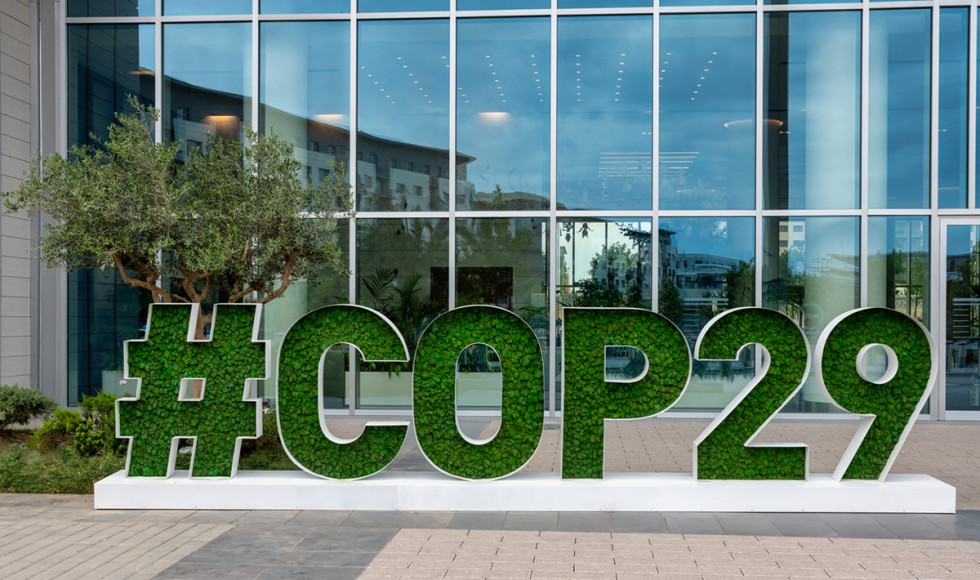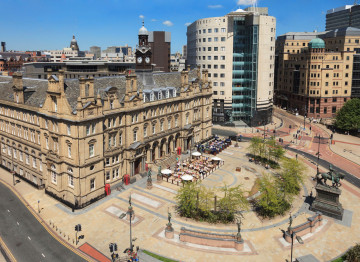The 29th Conference of Parties (COP29), held in Baku, Azerbaijan, brought together stakeholders from around the globe to address critical climate challenges. From financing energy transitions to managing water resources and climate resilience, the event highlighted the complexities of tackling climate change. While progress was made, the event also underscored the challenges of achieving consensus and meaningful action.
Alex Ferguson, CEO of Antea Group UK, attended the event for a few days along with some Associates from the Inogen Alliance. Below are some of his key takeaways from the event, focusing on its themes, outcomes, and implications for industries and regions like the UK.
1. What was the energy like at COP29, and what were the key perceptions?
The energy at COP29 varied depending on the zone and participants. I was in the Green Zone, which focused on commercial initiatives. The mood there was optimistic, with businesses showcasing real efforts to embrace sustainability. We're always going to be treading the line nowadays between genuine desire to do these things and greenwash, and we're still treading the line. However, I think the way that people were presenting themselves there, they’re certainly not going to put that much effort into talking about how they're changing their products, changing their design, changing their approach to doing business, if they're not actually going to do something about it.
In the Blue Zone, my colleagues there said it had a more sombre tone due to geopolitical tensions and uneven commitments from key players. For example, the US’ support may decrease with the new incoming presidential administration. Some were probably angry, but at the event itself there was more of a feeling of sadness and disappointment. Thae US stance also may have an effect on other countries’ commitments to helping, as they may see the US not committing and want to pull out, too. It felt like, right when we need leadership in the world, it's not coming from the West anymore.
A lot of politics were being played, which really emphasizes the challenges of global coordination and highlights missed opportunities for leadership from major economies.
2. How did you get connected to COP, and what role did Inogen Alliance and its partners play?
Inogen Alliance collaborated closely with its Azerbaijani partner, Sustainera Solutions, to contribute to COP29. Sustainera facilitated a program of events with Azersun, a key sponsor of the event, with Inogen team members participating in discussions and panels. These sessions addressed topics such as financing energy transitions and the role of private sector innovation in achieving sustainability goals.
Some Inogen Alliance Associates have very involved roles at COP, but the reason I got involved was that Sustainera was looking to run a series of panel discussions and asked whether there would be any associates willing to support that. I was on one of the panels, which discussed how to finance the energy transition. It was good to discuss energy transition globally, but also reinforce why local people are really the ones that can put it into practice on the ground.
3. Was there an overarching topic or theme at COP29?
COP29 was about financing: identifying where climate funds would come from and how they would reach the projects and regions that need them most. Discussions emphasised the need for robust environmental, social, and governance (ESG) standards to ensure funds are used effectively. Other recurring topics included waste management, sustainable aviation fuels, nature and biodiversity, and water resource management—underscoring the interconnectedness of energy, climate resilience, and environmental stewardship.
4. What insights emerged that could directly impact the UK market or your clients?
The importance of water management emerged as a critical area for the UK market. From flood resilience to drought management, the demand for expertise in water-related challenges is expected to grow significantly.
The UK’s position as a major economy with a strong stock market and a financial hub also places it in a pivotal role for channelling global climate funds to impactful projects. Additionally, biodiversity initiatives like the UK’s Biodiversity Net Gain (BNG) requirements are gaining international interest, potentially setting benchmarks for broader adoption.
5. How is the connection to the private sector evolving, and why is it important?
The private sector has become a key driver of climate action, with businesses recognising that sustainability isn’t just the right thing to do—it’s the smart thing to do. With geopolitical challenges hindering some public-sector commitments, companies are stepping up to lead the charge.
The business case for renewable energy and sustainable practices is stronger than ever, driven by the need for reliable resources and consumer demand. As sustainability becomes essential for long-term success, the private sector’s contributions are critical to accelerating the transition to a greener economy.
Many people get hung up in the morality of private-sector decisions. Some businesses are adopting sustainable practices not purely out of environmental concern but because they align with financial interests. It’s not always about the drivers, it’s about the positive actions being taken. If the private sector sees sustainability as profitable, they’ll invest. What matters is that the result benefits the environment and society.
If a company wants to invest in cheap renewable energy to make a profit or use water more efficiently to be a leader in the beverage industry, then great. They’re still doing the right thing at the end of the day. I don’t think we should get caught up in the drivers behind these decisions.
6. What were the key outcomes of COP29?
COP29 resulted in the establishment of a $300 billion climate fund, aimed at supporting energy transitions and climate resilience in emerging economies. However, concerns remain about the transparency and efficacy of this funding, with questions about the inclusion of private investments in the total.
We also still have a real lack of willingness to commit to phasing out fossil fuels, which is a problem. Whilst we recognise that we can’t instantly stop their usage, we have to commit to a plan to phase them out. There must be a total technical revolution in how the energy works, and I think there's an opportunity now for that to be a business case.
I think the real challenge and sadness is that I don't think we're going to get there before the small island states suffer badly. It feels like some of these small island states are almost collateral damage for a global political system, and that's really hard.
7. What are you personally taking away from this experience?
I really enjoyed Baku and Azerbaijan. Their hospitality, efficient organisation of the event, and public transportation were great.
Second, we’ve got some really strong members of Inogen Alliance and true global coverage. We had the global North and the global South all mixed in together, and all the regions of the world are supporting and working with each other.
Finally, while I think having the Green Zone makes sense, it’s the Blue Zone where the negotiations are and where things are actually happening. Across the event as a whole, I think people generally are eager to collaborate and support each other. We’ll see where it goes with the next COP in Brazil, and how the first six months of 2025 play out with the various challenges we’re facing around the world.
There is hope that momentum will continue to build and that the lessons learned this year will guide more impactful actions in the future.
Have any questions?
Contact us to discuss your environment, health, safety, and sustainability needs today.





